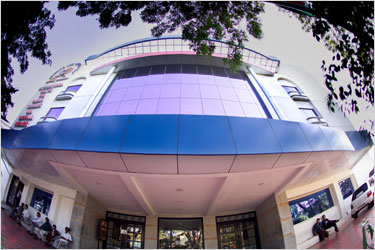All you want to know about your Heart
1. How the heart works?
- Heart beats 70 – 80 times / minute; 1, 00,000 times a day.
- Heart has four chambers; two upper chambers called Atria and two lower chambers called Ventricles.
- Right side of the heart gets impure blood from all parts of the body and the left side of the heart gets purified blood from the lung which is sent to all parts of the body.
- Right side of the heart is separated from the left side by a wall called septum.
- There are four valves in the heart to prevent the backflow of blood.
- There are two major blood vessels, one carrying impure blood from the right side of the heart to lungs and other one carrying pure blood from the left side of the heart to other parts of the body.
- The blood vessels supplying heart are called coronary arteries.
2. What is high blood pressure ( BP )and how is it treated?
- High blood pressure results from the tightening of very small arteries
- It can be controlled by low salt diet, regular exercise, stress management, weight control.
- Your doctor will prescribe some medications if your BP is not controlled by the above measures.
3. What is cholesterol?
- Cholesterol is a type of fat produced in your liver and is found in all your body cells.
- There are two types of fat viz, Saturated and Unsaturated.
- Saturated fat is more harmful and is derived from animal products such as meat, dairy and eggs. Saturated fats clog our arteries and directly raise total and LDL (bad) cholesterol levels. Avoid them as much as possible.
- Lipoproteins carry cholesterol through blood stream.
- Two most important lipoproteins are HDL and LDL.
- HDL is beneficial and LDL is harmful.
- HDL is found in olive oil, sunflower oil ( they have low levels of LDL)
4. What is atherosclerosis?
- Atherosclerosis is a condition where cholesterol and other fats along with calcium and blood clot are deposited inside the arteries.
5. What are the treatment options available for the blocked arteries besides Bypass surgery?
A severely narrowed coronary artery needs treatment to reduce the risk of a heart attack. Various treatment options apart from surgery are:
- Angioplasty: Dilatation of a narrowed blood vessel with a help of a balloon.
- Stent : It involves insertion of a mesh or spring like metal device inside an artery at a site of narrowing after angioplasty. This will prevent collapsing of the artery.
6. What is arrhythmia?
- Arrhythmias are irregular heartbeats caused by a disturbance in the electrical activity of the heart.
7. What is an EPS?
- Electrophysiology study ( EPS) uses cardiac catheterization techniques to study patients who have irregular heartbeats ( arrhythmias)
8. What is RFA?
- RFA is Radio Frequency Ablation. It is an interventional procedure used for the treatment of arrhythmias.
9. What is a Pacemaker and how does it work?
- A pacemaker is a device which helps to regulate your heartbeat and produce electrical impulses that make the heart pump regularly.
10. What is Coronary angiography?
- Coronary angiography is a diagnostic test performed to study the blood supply to the heart, done under local anaesthesia.
- A small catheter is inserted through a blood vessel in the thigh or hand and a dye is injected into the coronary artery through this tube
11. What is meant by ‘Congenital Heart disease?
This refers to various abnormalities of the heart which are present at birth. The abnormalities can be of the following:
- Holes in the walls ( Septum) separating the chambers.
- Narrowing of valves or blood vessels.
- Abnormal location of blood vessels attached to the heart.
12. What is a Heart murmur?
- Normally when the heart valves open and close, they make a LUB- DUB sound that your doctor hears using a stethoscope.
- Any extra sound heard is called a murmur.
- Not all heart murmurs require treatment.
13. What is meant by ‘Cardiac Catheterization’?
- The term ‘cardiac catheterisation’ refers to the passage of a fine tube (called a catheter) into the heart chambers through a vein, or an artery, usually in the upper part of the thing. Blood samples and pressure measurements can be obtained from the chambers of the heart to help make an accurate diagnosis.
14. What are the major risk factors for heart disease?
- The major risk factors for heart disease are smoking, high cholesterol levels, high blood pressure, lack of exercise,, obesity, diabetes, old age, male gender, and heredity (family history of heart disease),post menopause incase of women.
15. What is an echocardiogram?
- An echocardiogram is a painless, non-invasive test that uses ultrasound to study the structure and function of the heart.
16. What is a Stress Test?
- A stress test is a common test that doctors use to diagnose coronary artery disease.
- You will be made to walk on a treadmill while ECG, BP and heart rate will be continuously monitored.
17. What is a thallium stress test?
- A thallium stress test is a nuclear study by which a radioactive substance is injected into your bloodstream to show how blood flows through your arteries.
- Doctors can see if parts of the heart muscle are low on blood supply, damaged or dead.
18. What is EECP?
- Enhanced External Counter Pulsation (EECP): The Enhanced External Counter Pulsation system is a novel non-invasive treatment for patients with heart failure.
19. What is Sphygmocor?
- This is non-invasive measurement of Central aortic blood pressure and stiffness of the central arteries .This helps to assess the risk of a person proned to have Coronary artery disease.




